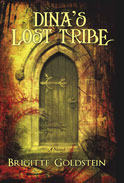
 |
Any serious student of history understands that researching the past is sometimes like taking a tour through a chamber of horrors. From the alleged blinding of 99 out of every 100 Bulgarian soldiers carried out by Byzantine Emperor Basil II in the aftermath of the Battle of Kleidion to the horrific impaling of tens of thousands by Vlad III of Wallachia, the ruler who inspired Bram Stoker's Dracula, man's inhumanity to man is well documented. Often these atrocities are based on religion tied to a specific ethnicity, as the Holocaust which resulted in the deaths of millions of Jews so tragically illustrated. Unfortunately, that is not the only time Jews have been targeted. During the early 1300s Philip the Fair of France had Jews forcibly expelled from his country, a move that caused a significant loss of livelihood and, at times, life for many of that ethnic background. The author uses that historical event as a key plot device as she weaves a powerful story of medieval times, modern times, and a hidden community that bridges the gap between them.
Nina Aschauer, a historian on sabbatical in the South of France, decides to try and find her birthplace, a small village called Valladine that her parents encountered in their flight from Nazi Germany. When she is finally taken to the secret village in the French Pyrenees she discovers love, a community living in the old ways, and a centuries-old codex that tells a haunting tale of pain and punishment. Nina eventually embroils her cousin and fellow scholar, Henner, along with her best friend, Etoile Assous, in the process of deciphering the manuscript, but bringing the truth it reveals of a medieval Jewess and a twisted priest to light is the least of their problems as they find themselves suddenly involved in a murder investigation that threatens to change the village and its reclusive inhabitants forever.
Reading like a literary mashup between James Hilton's Lost Horizon and Alice Hoffman's Incantation, Goldstein's story pulls the reader in from the very beginning. The narrative is composed of three voices: Dina's, the strong and resilient Jewess who manages to escape from her tormentor and carve out a new life for her and her sons in Valladine; Nina, whose notebooks recall her early life in the village and her perilous quest to see Dina's story published; and Professor Henry "Henner" Marcus of the University of Chicago from whose perspective the majority of the book is told. The three narrations interact seamlessly without creating the disconnect that so many novels of this type fall prey to, and all of them serve to develop the characters of their speakers effectively.
A holder of a Ph.D. in European history and a literary translator, Goldstein skillfully employs her background as she brings the medieval period to life through Dina. Yet she is equally adept at crafting an entertaining and believable story line for her more modern characters. The result of her efforts is a highly crafted tale that is well worth reading.
RECOMMENDED by the US Review